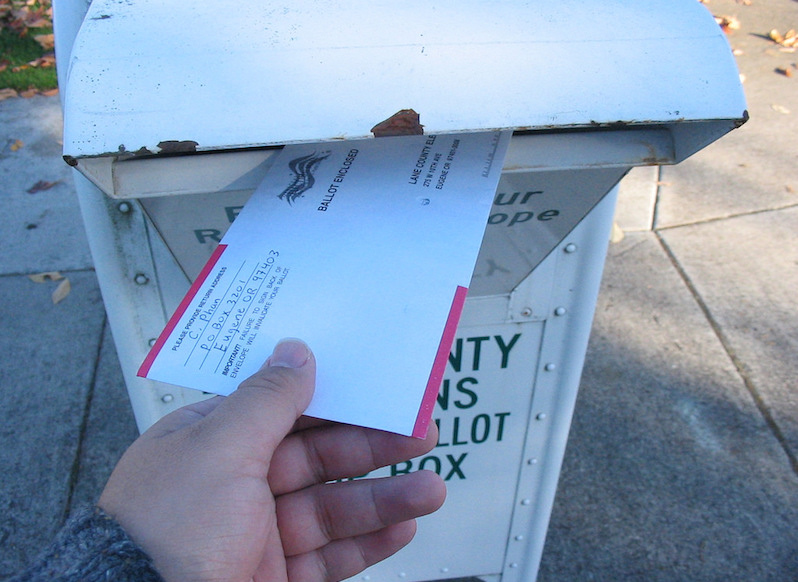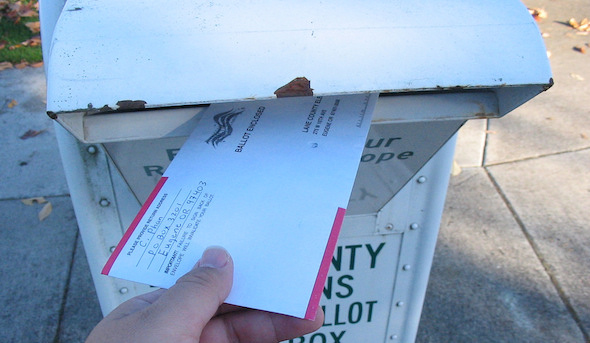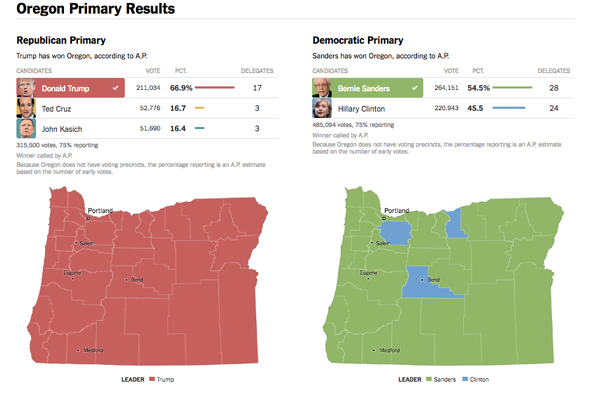Hillary Clinton Claims Kentucky Victory; Bernie Sanders, Donald Trump Take Oregon
With 99 percent of the Bluegrass State's Democratic primary vote counted, The Associated Press still hasn't named a victor. Sanders and Trump were the clear winners in Oregon.

Oregon holds vote-by-mail elections—and has one of the highest voter turnouts in the country. (via Flickr)
11:30 p.m. PST: Take a look at the (almost) final results from the Oregon and Kentucky primaries from The New York Times’ interactive maps below, keeping in mind that the Republican results in Kentucky are from March 5.

 10:00 p.m. PST: CNN is reporting that Hillary Clinton will prevail by a hair’s breadth in the Kentucky Democratic primary. Or, as The New York Times put it, Clinton declared victory in Kentucky. Meanwhile, Bernie Sanders beat her handily in Oregon, while Donald Trump quickly prevailed in the Oregon Republican primary.
10:00 p.m. PST: CNN is reporting that Hillary Clinton will prevail by a hair’s breadth in the Kentucky Democratic primary. Or, as The New York Times put it, Clinton declared victory in Kentucky. Meanwhile, Bernie Sanders beat her handily in Oregon, while Donald Trump quickly prevailed in the Oregon Republican primary.
Here’s CNN’s account:
Hillary Clinton got the win she badly needed—just barely.
It took a last-minute campaign blitz and a significant financial investment for Clinton to win the Kentucky Democratic primary by half a percentage point over her stubborn primary foe Bernie Sanders—in a state she won by 35 percentage points over Barack Obama in their 2008 primary clash and where her family has deep political roots going back decades.
Sanders, after racing Clinton right up to the finish line in the Bluegrass State, easily won the Oregon primary, and declared at a raucous rally in California that despite pressure from the Clinton campaign to abandon his quest for the nomination, he would stay in the race “until the last ballot is cast.”
6:30 p.m. PST: The Associated Press reports:
BREAKING: Democratic presidential primary in Kentucky between Hillary Clinton and Bernie Sanders is too close to call.
— The Associated Press (@AP) May 18, 2016
Currently, the delegates are within 1 percent of each other.
5:10 p.m. PST: The Kentucky Democratic primary results are coming in, and it’s an extremely tight race between Clinton and Sanders. With 65 percent of precincts reporting, Sanders has a 0.2 percent lead. It’s worth mentioning that Kentucky has closed primaries for both parties—and Sanders typically doesn’t do as well in closed primaries due to his large independent following. And the Kentucky secretary of state’s office predicted a light turnout of around 20 percent of voters.
2:24 p.m. PST: While we wait for the results, let’s take a look at some political drama happening in another state: Nevada.
Although Nevada held its Democratic caucus in February, political tensions exploded over the weekend at the Nevada Democratic Party convention. The New York Times reported:
[T]he state convention, held at the Paris Las Vegas Hotel, deteriorated into chaos after nearly 60 of Mr. Sanders’s potential delegates were deemed ineligible amid a dispute over the rules. The convention concluded abruptly after security staff no longer felt it could ensure the safety of the participants, many of whom were yelling and throwing things.
In the days since the tumultuous convention, Sen. Bernie Sanders has released a statement. The Associated Press reports:
Under pressure from Democratic Party leaders to denounce ugly tactics by his supporters, Sen. Bernie Sanders instead struck back with a defiant statement Tuesday that dismissed complaints from Nevada Democrats as “nonsense” and asserted that his backers were not being treated with “fairness and respect.” …
Sanders issued his statement moments after speaking with Senate Democratic Leader Harry Reid, who told reporters that Sanders had condemned the violence in Las Vegas. “This is a test of leadership as we all know, and I’m hopeful and very confident Sen. Sanders will do the right thing,” said Reid, D-Nev. …
Sanders’ statement seems unlikely to satisfy the demands from Reid, [Democratic National Committee chair Debbie] Wasserman Schultz, [Sen. Barbara] Boxer and others. It comes as Donald Trump is wrapping up the nomination on the Republican side, yet Democrats remain divided and now some Democrats fear that Sanders’ supporters are starting to mimic backers of Trump in their sexist and aggressive behavior.
Democrats also fear that the unrest in Nevada could be a taste of what is to come at the Democratic Party convention in Philadelphia this summer.
You can read Sanders’ entire statement here.
12:36 p.m. PST: It’s primary Tuesday again. Both parties are waiting for results in Oregon while the Democratic candidates are battling it out in Kentucky. Polls close in Oregon at 7 p.m. PST, and in Kentucky at 3 p.m. PST—so the first results will be rolling in soon.
Here’s what you need to know:
Oregon votes by mail, and hold closed primaries for both parties. Around 30 percent of Oregon voters are registered as nonaffiliated; Democratic candidate Bernie Sanders, however, is still expected to win the state. Oregon also recently implemented a new automatic voter registration system. The Nation reports: “The 51,558 voters signed up through automatic registration is an average of 12,889 new voters per month, three times higher than the average of 4,163 monthly registrants in 2012.”
Both Democratic candidates have been campaigning hard in Kentucky—Hillary Clinton had a packed Monday campaigning in the Southern state. Although she is “all but certain to claim her party’s nomination,” The New York Times writes, “she would prefer to stop losing primaries.”
Donald Trump, as the presumptive GOP nominee, has spent less time campaigning and has focused his attention on meeting with Republican leaders. The Los Angeles Times explains his unpopularity among members of his own party:
Trump, lacking the long-term relationships and campaign infrastructure of previous GOP nominees, must rely on state parties, their voter contacts and the phone-bank and door-knocking support they muster to bolster what has largely been a Twitter- and national-media-driven campaign. …
Backers of Trump, and sometimes the candidate himself, openly feuded with GOP leaders in a number of states, including several—Colorado, New Hampshire, Ohio, Virginia—that will probably be strongly contested this fall.
Though those party chiefs now profess their support for the presumptive Republican nominee, the depth of their commitment remains to be seen, as well as how readily they can marshal the donors, volunteers and other activists Trump will need to boost his chances in November.
Finally, although both Clinton and Trump seem to be focusing their campaign attacks on each other in advance of a likely general election match-up, recent polls show that Sanders would have a better chance of beating Trump in a general election.
Your support matters…Independent journalism is under threat and overshadowed by heavily funded mainstream media.
You can help level the playing field. Become a member.
Your tax-deductible contribution keeps us digging beneath the headlines to give you thought-provoking, investigative reporting and analysis that unearths what's really happening- without compromise.
Give today to support our courageous, independent journalists.






You need to be a supporter to comment.
There are currently no responses to this article.
Be the first to respond.